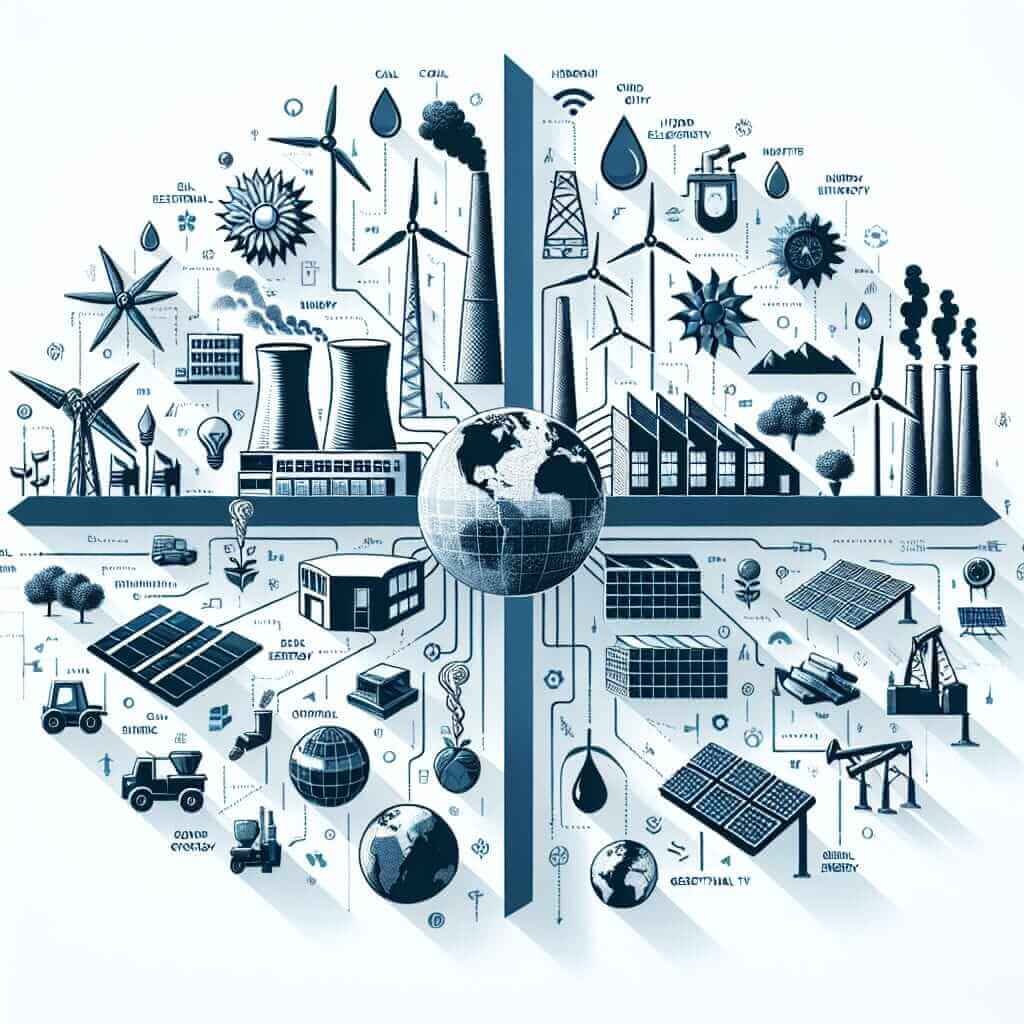The Reading section of the IELTS test is designed to assess a wide range of reading skills, from reading for gist, reading for main ideas, reading for detail, skimming, understanding logical argument, and recognizing writers’ opinions, attitudes, and purpose. One increasingly relevant topic that has emerged in recent years is the impact of renewable energy adoption on fossil fuel industries. This issue has seen a growing presence in IELTS Reading passages due to its relevance and timeliness.
Understanding the transition from fossil fuels to renewable energy, including factors such as economic, environmental, and social impacts, is crucial. This topic may also appear in future IELTS examinations due to its ongoing significance in global discussions and policy-making.
Main Content
Practice Reading Passage: Renewable Energy vs. Fossil Fuels
Passage Type: Medium Text
The global shift toward renewable energy has been gaining momentum over the past decades, driven by environmental concerns, technological advancements, and shifting economic landscapes. Renewable energy sources such as solar, wind, hydro, and geothermal are becoming increasingly cost-competitive compared to traditional fossil fuels. This transition is profoundly impacting fossil fuel industries, leading to a reshaping of the global energy market.
Globally, governments are implementing policies and subsidies to encourage renewable energy adoption. Countries are setting ambitious targets for reducing carbon emissions and increasing the share of renewable energy in their energy mix. For instance, Germany’s Energiewende aims to phase out nuclear power and reduce greenhouse gas emissions by promoting renewable energy. Similarly, China’s investment in solar and wind power has made it a leading producer of renewable energy.

However, the impact on fossil fuel industries is significant. Traditional energy companies are facing declining demand, stranded assets, and shrinking profit margins. Coal, in particular, has seen a dramatic decline in many countries where once-thriving mining communities are now dealing with economic hardship. The oil and gas sector is also adapting by investing in renewable energy projects and diversifying their portfolios.
While the renewable energy transition presents challenges for fossil fuel industries, it also offers opportunities for innovation and economic growth. Emerging markets for renewable technologies are creating new jobs and industries. For instance, the development of electric vehicles (EVs) is reducing dependence on oil while simultaneously promoting advances in battery technology.
Questions
Below are practice questions based on the given passage to help you prepare for the IELTS Reading section.
Multiple Choice Questions
-
What is one driver of the global shift toward renewable energy?
- A) Lower cost of fossil fuels
- B) Environmental concerns
- C) Decreasing government subsidies
- D) Increased reliance on nuclear power
-
What is the purpose of Germany’s Energiewende plan?
- A) Increase coal production
- B) Promote renewable energy and reduce greenhouse gas emissions
- C) Continue reliance on fossil fuels
- D) Decrease investment in solar energy
True/False/Not Given
-
China is currently one of the leading producers of renewable energy.
- True
- False
- Not Given
-
Renewable energy sources like solar and wind are still more expensive than fossil fuels.
- True
- False
- Not Given
Matching Information
-
Match the country with its renewable energy policy or initiative:
- Germany
- China
i. Energiewende
ii. Investment in solar and wind power
Answer Key and Explanations
-
B) Environmental concerns
- Explanation: The passage states that environmental concerns are one of the drivers of the shift toward renewable energy.
-
B) Promote renewable energy and reduce greenhouse gas emissions
- Explanation: According to the passage, Germany’s Energiewende aims to phase out nuclear power and reduce greenhouse gas emissions by promoting renewable energy.
-
True
- Explanation: The passage mentions that China has made large investments in solar and wind power making it a leading producer of renewable energy.
-
False
- Explanation: The passage states that renewable energy sources are becoming increasingly cost-competitive compared to traditional fossil fuels.
-
- Germany: i. Energiewende
- China: ii. Investment in solar and wind power
- Explanation: These matches are based on specific initiatives or policies mentioned in the passage for each country.
Common Mistakes
- Misinterpreting information: Be sure to distinguish between the factual statements in the passage and the author’s opinions.
- Overlooking details: Pay close attention to specific information, such as data and examples, which are often the basis for questions.
Vocabulary
- Momentum /məˈmɛntəm/: (noun) the force that keeps an object moving or keeps an event developing after it has started.
- Ambitious /æmˈbɪʃəs/: (adjective) having a strong desire for success or achievement.
- Stranded /ˈstrændəd/: (adjective) left without the means to move from somewhere.
- Diversifying /daɪˈvɝːsɪˌfaɪɪŋ/: (verb) to develop a wider variety of products, investments, etc. in order to be more successful or reduce risk.
Grammar Point
- Present Continuous for Future Plans: “Countries are setting ambitious targets for reducing carbon emissions.”
- Structure: Subject + am/is/are + present participle (verb+ing)
- Example: The company is launching a new product next month.
Tips for High IELTS Reading Score
- Skim and scan: Quickly skim the passage to get an overview, then scan for keywords to find specific information.
- Manage your time: Allocate enough time for each question and avoid spending too much time on difficult ones.
- Practice regularly: Use diverse reading materials to improve your reading speed and comprehension skills.
- Understand question types: Familiarize yourself with various question types like True/False/Not Given, Multiple Choice, and Matching Information.